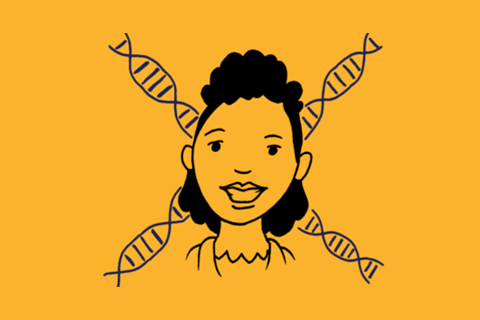The Immortal Legacy of Henrietta Lacks
thinx archive
·5 min read

by Team Thinx | 04/25/2017
This weekend was like Coachella for science (it was also the actual Coachella, but whatever). The March for Science, which took place on Earth Day, called for political leaders and policymakers to enact evidence-based policies in the public’s interest. And because in 2017 we have to march to remind people that science is important. Also because scientists make the best protest signs:
Saturday also saw the release of a new HBO movie, starring up-and-comer Oprah Winfrey (you may have heard of her), The Immortal Life of Henrietta Lacks. The movie is based on a 2010 book of the same name, but to celebrate the release of the movie and in the name of SCIENCE (and to acknowledge the fact that you might be more likely to watch it on HBO than read the book you darned millennials) – let’s take a closer look.
Henrietta Lacks tragically died of cervical cancer on the 4th of October 1951, at age 31. She left behind five children, and, unbeknownst to her or her family, a legacy for modern medicine. During surgery at John Hopkins Hospital to remove Henrietta’s tumor, doctors took a small piece for research, without her consent. For years priors, scientists had been unsuccessfully attempting to grow human cells for biomedical research. When Henrietta’s tissue was tested, scientists were shocked to discover that not only were the cells not dying, they were quickly reproducing— they were “immortal.” HeLa, as the cells became known, served as the basis for some of the most significant scientific breakthroughs of all time: the polio vaccine, chemotherapy, cloning, AIDS treatments, and IVF all owe their origins to Henrietta Lacks and her immortal cells.
However, the Lacks’ family were kept in the dark about the use and impact of their mother’s cells, even as the science and medical industries made a ton of money (while the Lacks family struggled to receive adequate healthcare). The movie focuses on Lacks’ family, particularly, through a stunning performance by Oprah. Seriously, it’s pretty hard to forget you’re watching Oprah (it’s Oprah), but her performance in this movie is enough to make you completely believe her as Deborah, Henrietta’s daughter. Deborah struggles with her mother’s legacy, and through her relationship with Rebecca Skloot, played by Rose Byrne, the white author of the bestselling book, the movie touches on the other issues that make Henrietta’s story so important.
There is a long and terrible history of exploitation of African-Americans by the science and medical industry. The best known example of this is the Tuskegee syphilis experiment, in which 399 African-American men were subjects of a study to examine the progression of untreated syphilis, but the history of experiments and research on black Americans reaches back as far as the 17th century, according to Harriet Washington, author of Medical Apartheid: The Dark History of Medical Experimentation on Black Americans from Colonial Times to the Present. The relationship between Deborah and Skloot also raises questions about Skloot's ability to access and penetrate the medical industry, one that, for so long, shut Deborah and the rest of the Lacks family out.
As Oprah said in an interview with the NY Times: “I live to tell stories that touch on what it means to be a black woman in the world, so I still feel it’s a miracle that we know it was an African-American woman who contributed all this to the medical field and we wouldn’t even know the story without Rebecca Skloot.”
The impact and legacy of women (particularly women of color) in science has been long overlooked. The release of Hidden Figures put the spotlight on the lives and achievements of three African-American NASA mathematicians, and we’re hoping that the movie’s success (grossing $200M worldwide) will pave the way for more. If we might be so bold, Hollywood (and Oprah, if you’re reading), could we suggest a couple more?

Taraji P. Henson in Hidden Figures, via giphy
There’s never been a really good movie about Marie Curie, the first woman to win the Nobel Prize in Physics and who tragically died from illnesses related to the very thing she was studying (Meryl Streep, what’s upppp?). We’re still waiting on films about Rosalind Franklin, who helped discover DNA (along with some controversy along the way); Mae Jemison, the engineer, physician, and NASA astronaut who was the first African-American woman to go to space; Kathryn D. Sullivan, the first American woman to walk in space; and Chien-Shiung Wu, a Chinese-American physicist who made significant contributions to nuclear science.
Oh, and Peggy Whitson, aka @astropeggy, who, on Monday, surpassed the 534-day record for the most time spent in space by an American!
Who have I missed? What are your fantasy casting picks? Let me know in the comments!
by Team Thinx


